News & Event


News & Event
News & Event
[The 109th Wednesday Forum] The Emergence of Future Car and Mobility Innovation
- Writer Yeory Lim
- Date2019-08-22
- Hit1,194
KISTEP held the 109th Wednesday Forum with the theme of ‘The emergence of future car and mobility innovation’ on August 21st (Wed), 2019.
The automotive paradigm is rapidly changing due to strengthened global environmental regulations and changes in social structure. Among them, ‘eco-friendly’ and ‘self-driving’ are considered as the major key words in future car industry. The emergence of future car accelerates changes and innovation of mobility, and this is the time to discuss relative issues to secure stability of future car and to provide innovative mobility services. Therefore, this forum was held to examine the current status of internal and external mobility markets and environmental changes, and to seek alternative policies to expand supplies of future car and to provide innovative mobilities.
The automotive paradigm is rapidly changing due to strengthened global environmental regulations and changes in social structure. Among them, ‘eco-friendly’ and ‘self-driving’ are considered as the major key words in future car industry. The emergence of future car accelerates changes and innovation of mobility, and this is the time to discuss relative issues to secure stability of future car and to provide innovative mobility services. Therefore, this forum was held to examine the current status of internal and external mobility markets and environmental changes, and to seek alternative policies to expand supplies of future car and to provide innovative mobilities.
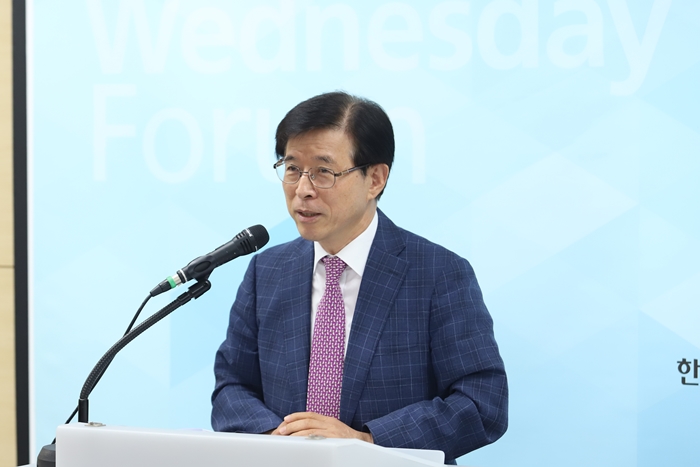
▲ Sang-seon Kim (President, KISTEP)
The forum began with the opening address by President Sang-seon Kim (KISTEP), followed by the presentation of Kyuok Kim (Director, Center for Autonomous Driving and Future Vehicles, The Korea Transport Institute). Panel discussion were led by Young-mo Koo (Director, Fuel and Emission system R&D center, Korea Automotive Technology Institute), Jin Hur (Professor, Department of Electrical Engineering, Incheon National University), and Young-Hyun Jin (Director, Center of Growth Engine R&D Coordination, KISTEP) and open floor discussion followed.
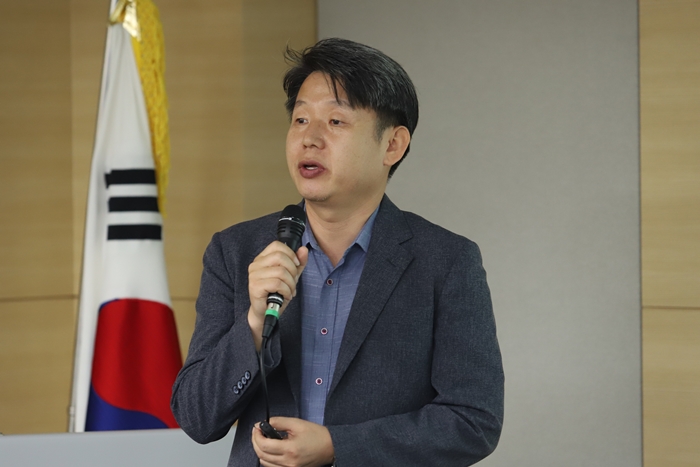
▲ Kyuok Kim (Director, Center for Autonomous Driving and Future Vehicles, The Korea Transport Institute (KOTI)
First, director Kyuok Kim explained the changes in environment and conditions surrounding automobile markets. He said “Changes in population structure due to aging and declining of producing population will have a significant impact on automobile ownership and the direction of future car development,” and quoted “Strengthened environmental regulations will gradually expand eco-friendly car markets, and it will take up half of the car markets in a few years” from Frost&Sullivan. Moreover, worldwide competition on developing self-driving cars triggered car markets to shift from machine-centric to electric-centric.
Next, director Kim categorized future cars into ▲eco-friendly car ▲electric car ▲hydrogen car ▲self-driving car and explained introduction issues for each type. Firstly, he suggested that eco-friendly cars encompassing electric and hydrogen cars can increase their acceptability by expanding charging infrastructures and providing subsidies. Among them, electric cars show expanded supply in diverse ways including performance improvement, emergence of small electric cars, and use of electric cars as buses and sharing cars. 889 domestic hydrogen cars were in operation in 2018 and their supplies became visible, however, securing stability, strengthening economic feasibility, and expanding charging infrastructure are required in order to improve acceptability of hydrogen cars. Then he further explained the decisive factors for acceptability of self-driving cars such as technology, safety, ethical issues, and privacy protection.
Director Kim presented mobility innovation from the emergence of future car and claimed that “A future car is ‘an eco-friendly car equipped with self-driving function,’ and self-charging utilizing AI and decision making during driving will be possible.” He added that the smart mobility service connecting car-thing-space by sharing external environment of cars and information between cars will emerge. To support this, he pointed that integrated mobility service, car sharing service, and total mobility service should be developed. Lastly, in order to operate future cars, he emphasized that improvement of relative legal acts and education are necessary to support infrastructure developments; digital infrastructures that can constantly share information with physical infrastructures such as roads and charging stations, and logical infrastructures such as AI development to logically analyze data.
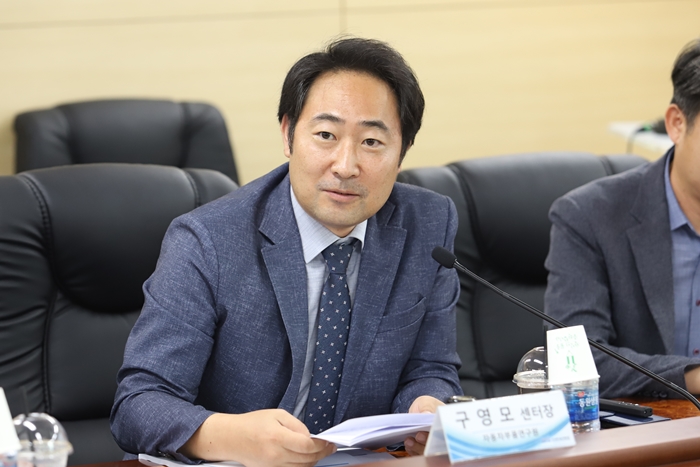
▲ Young-mo Koo (Director, Fuel and Emission system R&D center, Korea Automotive Technology Institute (KATECH))
In panel discussion, Director Young-mo Koo explained the status of future car saying “Electric cars are currently dominant in supply because hydrogen cars don’t have enough infrastructures yet. But electric cars are not suitable for commercial vehicles with long mileage due to its high power consumption.” He also suggested that “Hydrogen cars have energy to use as commercial vehicles, but they need more development in durability.” Research of hydrogen cars considering the energy consumed in transporting hydrogen and energy loss during charging is required, and he stressed that a full process assessment should be introduced to clearly see the performance compared to investment. Lastly Director Koo suggested that policies should be prepared to deal with crisis of component-related small and medium-sized companies citing a situation that future cars have less but more expensive components than current cars.
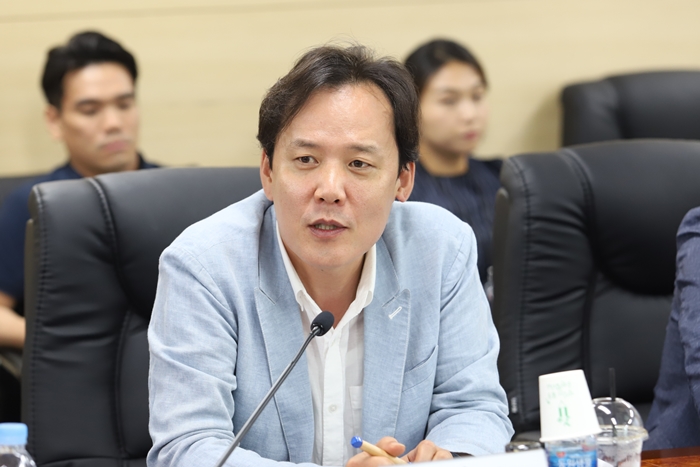
▲ Jin Hur (Professor, Department of Electrical Engineering, Incheon National University)
Professor Jin Hur claimed that “The research of self-driving cars in automobile production companies will be active because it is considered to have high-value and the importance of infrastructure also will be continuously emphasized. But it is hard for electric cars to grow unless they are supported by regulations or government policies.” He also said that “Although a sensor is 99.9% accurate, it can be a dangerous probability in a car related to human lives.” and explained the distinctive nature of future cars that must satisfy durability and credibility, despite of the importance of the electric technology in future cars. Lastly, he emphasized that “It is important for mechanic and electric technologies to cooperate each other rather than two-ways of thinking to develop future cars.”
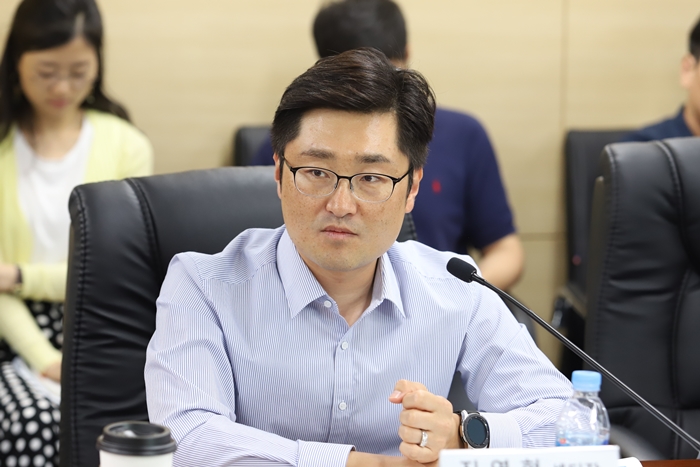
▲ Young-Hyun Jin (Director, Center of Growth Engine R&D Coordination, KISTEP)
Director Young-Hyun Jin said that “The government investment in automobile industries brought visible technological improvement in the areas.” He evaluated that domestic production technology of future cars has competitiveness saying “Korea made the first mass-produced hydrogen car in the world, and the mass production system of Hyundai is about two years ahead of its global competitors.” He pointed out the threshold of material areas, however, commenting that “For hydrogen cars, the localization rate is 95%, but the source materials for components depend on other countries.” Also, he suggested that “The government should support material development by government R&D programs, put more effort in expanding infrastructures related to hydrogen cars, and major companies, the source of demand for the technologies, should support the research and development as well.”
